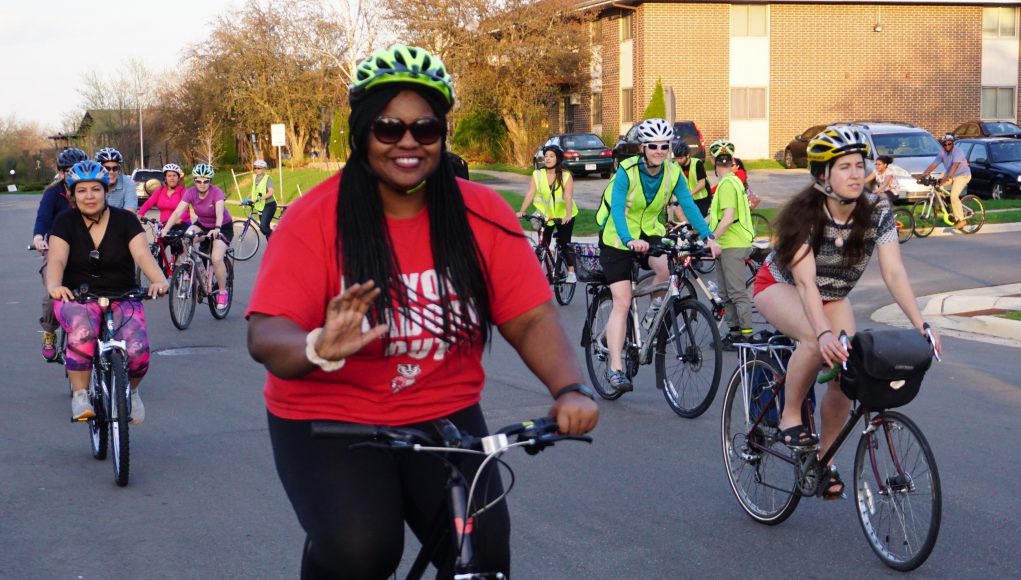When about 60 people on bicycles rolled through south side neighborhoods on Friday night, May 4, people noticed.
“What are you riding for?” yelled a man from inside an apartment building.
“Racial equity!” shouted event creator Oboi Reed, the founder and CEO of Equiticity.
Others honked their horns, cheered and waved as the stream of black, brown and white bicyclists ranging in age from 3 to 65 pedaled 10 miles through some of Madison’s most diverse neighborhoods.

(Photo by Diane Schwartz)
Reed wanted to create a ride that celebrated the unity and diversity of Madison and to connect communities together.
“We want racial equity for black and brown communities,” he said. “Our neighborhoods are most impacted by racial inequalities and events like this help bring people together and show people that we can transform our neighborhoods by riding our bikes.”
Reed is traveling across the country talking about equitable biking and encouraging communities of color, city officials and bicycle advocates to build biking infrastructures, such as bike sharing stations, bike lanes and bike paths in poorer parts of cities. Reed was a featured speaker at the Wisconsin Bike Fed’s annual Bike Summit on Saturday, May 5 in Madison.

(Photo by Diane Schwartz)
The Madtown Unity Ride was the kick-off to the Summit.
Baltazar De Anda Santana, Community Outreach Coordinator for the Wisconsin Bike Fed Madison, organized the Unity Ride to reach black, brown and Indigenous people of color who live or work in a predominantly low- to moderate-income, communities of color in Madison.
“I’m happy that we brought so many groups together,” he said. “It’s a very diverse crowd.”
The event was sponsored by community organizations including Centro Hispano, Boys and Girls Club of Dane County, The Urban League of Greater Madison, the Tour of the Latino Family, The Foundation for Black Women’s Wellness and Badger Rock School.
“At the local level, our goal is for communities of color to know the city and how to get around on the bike paths. We want to do a ride like this every month. We want to show that biking is okay in communities of color,” said De Anda Santana.

(Photo by Diane Schwartz)
Furthermore, it’s important for black, brown and indigenous people to participate in social rides like this one, explained Caressa Givens, Bike Fed Milwaukee Community Project Coordinator.
“It’s important to have a good time. There are communities all over the country rising to the top and getting involved with bike culture,” she said.
She stressed that when introducing biking to black and brown communities, we have to think about it differently.
“In these communities, biking isn’t always safe and it isn’t always convenient,” she said.
This was evident on the ride when bikers had to walk on the sidewalk and travel across busy streets. One time, bikers traveled off road for a short stretch on a grassy path.
No one complained.
“Rides like this teach people how they can interreact to the bike in a meaningful way. It may not look like how others [white people] use bikes. It’s not always about going from point A to point B. Socialization is a key part of the process,” Givens added.

(Photo by Diane Schwartz)
So is support.
Thanks to sponsorship by Planet Bike, Dream Bikes and the Freewheel Community Bike Shop, the ride offered free helmets, bike lights and bike tune-ups to participants. There was food throughout and many volunteers who helped with traffic and made sure that the riders were safe.
Saran Ouk, with Black Girls Do Bike, was one of the participants. She just got a bike three weeks ago. This was her first ride of the season and she wanted to go slow.
“I saw the post on Facebook and liked the idea of equity and bringing awareness of biking to people of color,” she said.
Chloe Brown, who works at National Guardian Life, had to borrow a bike to participate.
“This was my first group ride. It was relaxing and peaceful,” Brown said. “I want to get a bike. I’ll never do 100 miles like the Black Girls Do Bike group does, but I’ll get out there.”

Alan Crossley was inspired by the ride. Crossley is a volunteer with Wheels for Winners and came out to serve as a bike mechanic. He’s been participating or helping with De Anda Santana’s rides for a while.
“Besides the wonderful energy, the beautiful night and the great people, I was inspired by the many young and older people that ran out to greet us and thought what we were doing was so cool,” he said.
Maybe it is possible to transform a community simply by riding a bike.
For more information on the next ride, you can contact Baltazar De Anda Santana at [email protected].




























